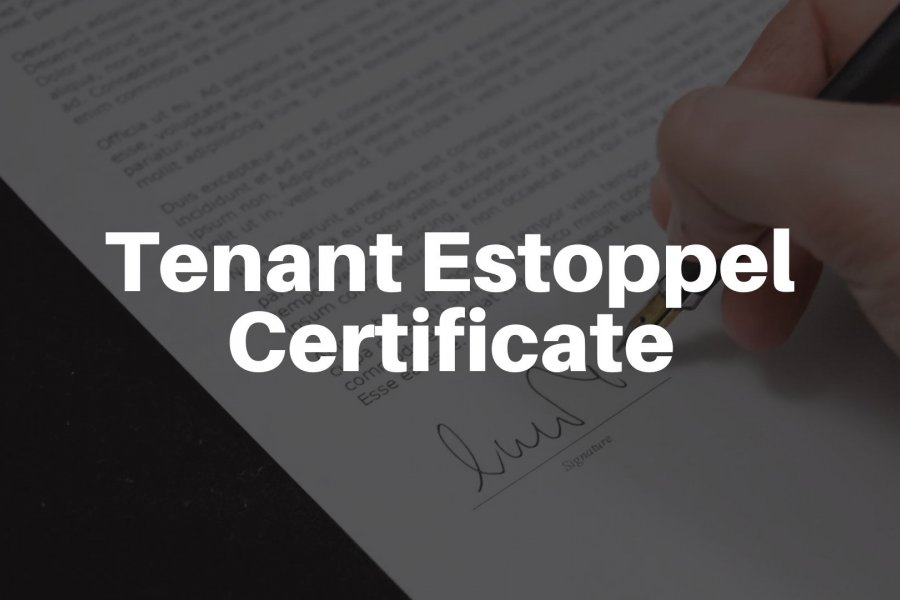Tenant Estoppel Certificate

Managing rental properties requires landlords to navigate a variety of legal and administrative processes that ensure smooth operations and protect their interests.
From tenant screenings to lease renewals, landlords deal with numerous documents and agreements that help maintain transparency and avoid potential problems. One such document that plays a pivotal role in safeguarding landlord interests is the Tenant Estoppel Certificate.
While the term might sound technical or overwhelming at first, the Tenant Estoppel Certificate is a straightforward yet essential tool that provides a formal means to verify critical details about a tenant’s lease agreement.
Whether you are preparing to sell a property, refinancing, or transitioning property management teams, understanding the significance and proper use of a Tenant Estoppel Certificate is essential. This certificate helps prevent disputes, miscommunications, and potential financial setbacks.
In this article by Evolve Denver, we will explore the key components of the Tenant Estoppel Certificate, why it is important for landlords, and how to effectively incorporate it into your property management practices.
What Is a Tenant Estoppel Certificate?
A Tenant Estoppel Certificate is a document signed by the tenant that confirms and verifies specific details about their lease agreement with the landlord.
It is typically requested during property sales, refinancing, or when a landlord is transferring property management responsibilities. By completing the certificate, the tenant affirms the terms of their lease and acknowledges that they are accurate as of the date of signing.

The primary purpose of the Tenant Estoppel Certificate is to:
- Clarify Lease Terms: It serves as a written confirmation of the lease terms, helping to prevent misunderstandings.
- Provide Assurance: The certificate assures prospective buyers, lenders, or investors that the tenant’s lease agreement is in place and that there are no hidden surprises.
- Verify the Absence of Hidden Agreements: It verifies that there are no other verbal or written agreements between the landlord and tenant beyond the formal lease, avoiding future legal complications.
Why Is It Important for Landlords?
For landlords, the Tenant Estoppel Certificate offers several key benefits that help protect their interests and ensure smooth operations:
- Protects Against Disputes: By having tenants confirm the lease terms in writing, landlords are less likely to face disputes about misunderstandings or claims of verbal agreements. If a tenant later claims that the terms of the lease were different, the certificate provides proof of the agreed terms.
- Facilitates Property Transactions: When selling a rental property, potential buyers often request Tenant Estoppel Certificates to verify the rental income and lease obligations. This helps buyers feel confident in their purchase and ensures that they are not surprised by any hidden issues or obligations.
- Supports Financing Efforts: Lenders often require Tenant Estoppel Certificates as part of their due diligence process when refinancing a property or securing loans. The document helps lenders verify that the rental income is consistent with the landlord’s claims and that tenants are meeting their obligations.
- Reveals Unresolved Issues: If tenants disclose any ongoing issues, such as maintenance concerns or disputes over rent payments, the certificate alerts landlords to potential problems that need to be addressed before they escalate.

Key Components of a Tenant Estoppel Certificate
To ensure that the Tenant Estoppel Certificate is thorough and effective, it should include the following essential elements:
1. Tenant Information
- Full name(s) of the tenant(s).
- Unit or property address.
2. Lease Details
- Start and end dates of the lease agreement.
- Monthly rent amount and payment schedule.
- Security deposit amount held by the landlord.
3. Confirmation of Lease Terms
- Statement that the lease is currently in full force and effect.
- Acknowledgment of any amendments or addendums to the lease.
4. Acknowledgment of Payments
- Confirmation that the tenant is current on rent payments.
- Disclosure of any prepaid rent or rental credits.
5. Representation of Agreements
- Statement affirming that no additional verbal or written agreements exist outside of the signed lease agreement.
6. Disclosure of Issues
- Any unresolved maintenance issues, disputes, or claims against the landlord.
Tenant’s Signature and Date
- The certificate must be signed and dated by the tenant to ensure its validity.
How to Use a Tenant Estoppel Certificate Effectively
When to Request It
Landlords should request a Tenant Estoppel Certificate during key moments, such as:
- When selling the property or planning to transfer ownership.
- Before refinancing or applying for loans.
- When transitioning to a new property management company.
Providing Clear Instructions
To ensure accuracy, landlords should:
- Explain the purpose of the document to tenants clearly.
- Provide tenants with a template or form that includes all necessary fields and instructions for completion.
Reviewing the Responses
After receiving the completed certificate, landlords should:
- Carefully review the information for accuracy.
- Address any discrepancies or flagged issues promptly to avoid complications.

Maintaining Records
It is crucial to keep signed copies of all Tenant Estoppel Certificates as part of your property management records. These documents can serve as important evidence in case of disputes or legal issues. By maintaining a thorough and organized record, landlords can quickly address any tenant disputes or claims, using the estoppel certificate as a clear reference.
Additionally, having these records readily available can expedite the resolution of any legal matters, as they provide a documented history of the lease terms and tenant obligations. Proper documentation ensures that landlords are prepared for potential audits, legal action, or property transactions in the future.
Bottom Line
Tenant Estoppel Certificates are invaluable tools for landlords, providing a verified record of lease details, preventing disputes, and facilitating property transactions and financing efforts. By requesting these certificates at the appropriate times and ensuring their accuracy, landlords can maintain transparency, protect their interests, and avoid potential legal or financial complications.
Navigating the complexities of Tenant Estoppel Certificates and other administrative tasks can be daunting for landlords. Evolve Denver offers expert guidance to landlords, ensuring that every step is handled with precision and professionalism. From preparing accurate templates and managing tenant communications to resolving discrepancies, our team provides comprehensive support to streamline your property management processes.
If you’re ready to simplify your landlord responsibilities and ensure that your property management is handled efficiently, contact Evolve Denver today. Let us take care of the details, so you can focus on growing your investment portfolio and ensuring the long-term success of your rental properties.
